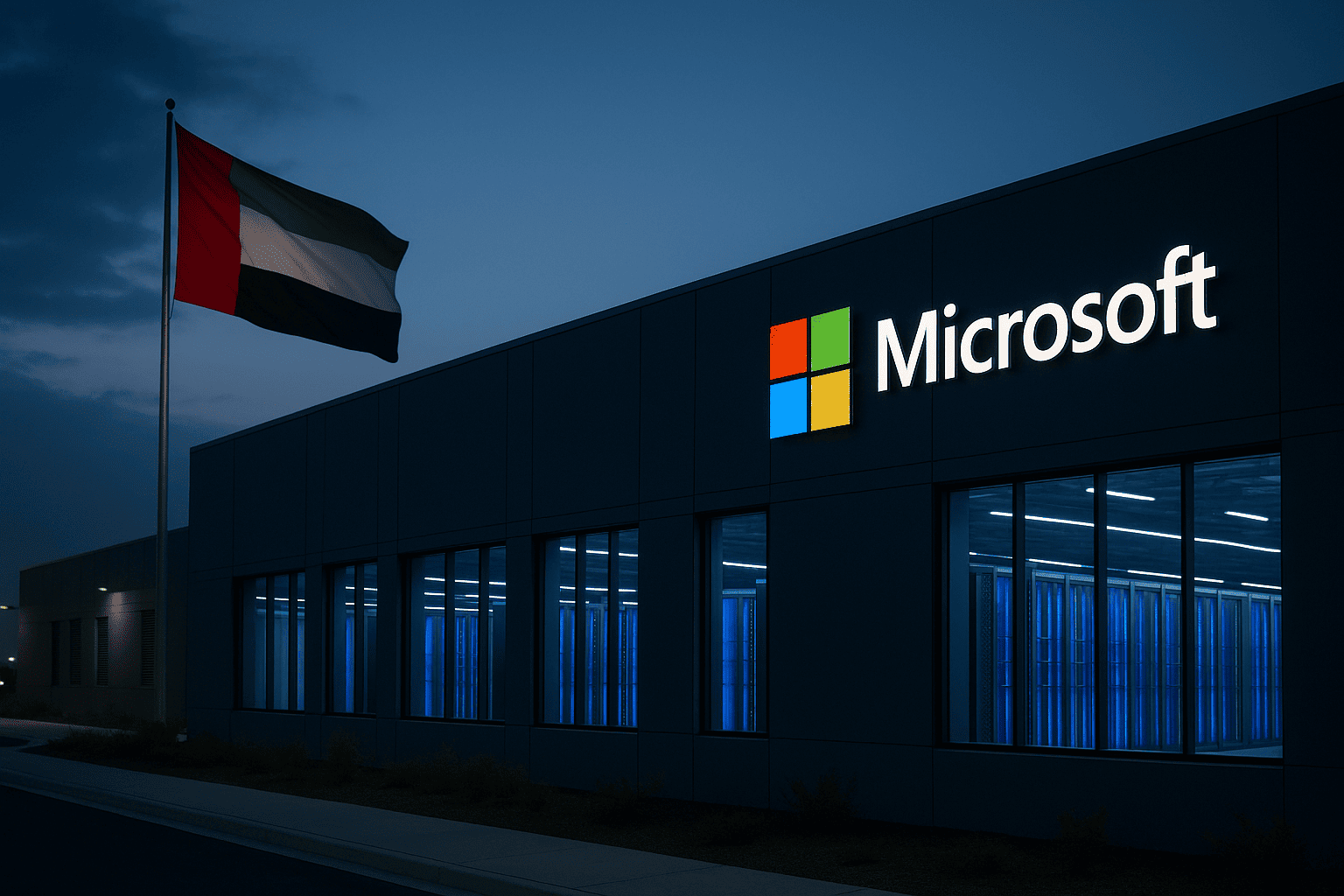Microsoft Invests $15B in UAE, Wins Nvidia Chip Licenses
By Tredu.com • 11/3/2025
Tredu

What happened, and why it matters
Microsoft invests $15B in UAE, wins OK to ship Nvidia chips, after obtaining U.S. export licenses that allow shipments of advanced AI accelerators into Emirati data centers. Reuters reported that Microsoft plans about $15.2 billion of investment through 2029, focused on artificial intelligence infrastructure, with phased deliveries of Nvidia hardware that include A100, H100, H200, and GB300 class processors. The company said deliveries are pending, arriving within months as sites are energised. The initiative aligns with the UAE’s plan to position itself as an AI hub.
License scope and security conditions
The approvals permit exports of advanced Nvidia chips to Microsoft-operated facilities in the UAE under conditions set by Washington. Prior coverage described strict cybersecurity and physical security requirements, including controls on access, monitoring, and supply-chain provenance. These stipulations reflect U.S. objectives to manage technology transfer while enabling trusted deployments with partners that meet compliance standards.
How the money will be spent
Microsoft’s spending blueprint centers on new data halls, networking, and high-capacity power, with a multi-year ramp between 2026 and 2029. Capital will fund liquid-cooling systems, optical links, and storage, plus cloud services that tie clusters into product workloads. The UAE program sits alongside Microsoft’s broader capacity push that includes separate agreements for Nvidia-based systems in the United States and Europe.
Role of G42 and earlier ties
The expansion follows Microsoft’s 2024 investment of $1.5 billion in Abu Dhabi-based G42, which gave Microsoft a board seat and established Azure as a core platform for G42 applications. That partnership proceeded after G42 curtailed ties to Chinese vendors, an adjustment U.S. officials welcomed. The current licenses build on that trajectory, reinforcing a framework in which sensitive components are deployed under U.S.-aligned safeguards.
Strategic calculus for Microsoft
Securing exports to the UAE diversifies Microsoft’s network of high-performance sites, which helps match demand from regional customers and sovereign programs. Staged chip deliveries reduce scheduling risk for model training and inference, while power and grid interconnect milestones determine when capacity becomes usable. The company can run training on dense clusters, then migrate mature workloads to inference fleets as models stabilize, improving cluster utilization over time.
What the licenses imply for Nvidia supply
The license package spans multiple Nvidia generations, including GB300, which is expected to underpin next-cycle training clusters. Access to such parts signals confidence that supply chains for high-bandwidth memory, networking, and packaging will support phased builds. The UAE deployments will rely on coordinated shipments of servers, optics, and power gear, not only the accelerators themselves, a bottleneck that has shaped industry timelines in 2025.
Geopolitical and policy context
Washington has treated the UAE as a partner of interest for advanced compute, subject to verification. Lawmakers previously sought reviews of the G42 tie-up, citing potential exposure to Chinese technology. Subsequent steps to unwind those ties were cited by U.S. officials as positive developments. The new permissions reflect a balance: guardrails on access and operations, coupled with a willingness to support allied capacity that competes with alternative ecosystems.
Economic effects in the Gulf
The program adds demand for skilled labor, power infrastructure, and construction services. It complements national initiatives that target cloud, cybersecurity, and AI services for government and industry. Local firms benefit from procurement of fiber, substations, and cooling equipment, while universities and research centers gain a nearby platform for training and inference. The initiative dovetails with the UAE’s pitch to global developers who want low-latency access to users in the Middle East, Africa, and South Asia.
Risks and sensitivities
Execution depends on grid upgrades, substation lead times, and energy procurement. Export permissions can carry reporting duties that slow change management if not planned for. Global allocation of Nvidia parts remains tight, which introduces delivery risk if suppliers slip. Policy shifts could modify license terms for new architectures, affecting future expansion. A power constraint, not chips alone, can cap near-term throughput if utility schedules lag hardware readiness.
Competitive read-through
The deal underscores competition among hyperscalers to place state-of-the-art clusters close to customers. It arrives alongside Microsoft’s other capacity contracts, including a five-year agreement for Nvidia-based systems with IREN in Texas. AWS and Google are also staging large deployments, with each provider seeking long-term power and land positions. For users, the result is more regional choice, plus redundancy across providers and jurisdictions.
What to watch next
Markers include the first license-backed shipments arriving at UAE sites, energization of new data halls, and disclosures on clean-power contracts. Investors will track capex cadence into fiscal 2026 and whether Microsoft updates guidance on AI attach rates in Azure. Regulatory watchers will look for any additional export approvals that expand the number of permitted facilities, or that extend to networking components and future Nvidia generations.
Bottom line
Microsoft invests over $15B in the UAE and secures U.S. licenses to ship Nvidia chips, a twin track that grows regional AI capacity while navigating export controls. The build will roll out in phases, and success will depend on power, supply logistics, and adherence to security conditions.

How to Trade Like a Pro
Unlock the secrets of professional trading with our comprehensive guide. Discover proven strategies, risk management techniques, and market insights that will help you navigate the financial markets confidently and successfully.


